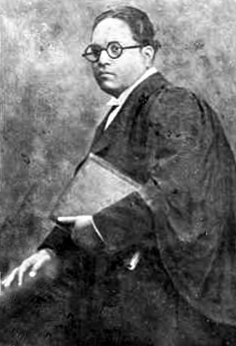B. R. Ambedkar
Indian jurist, economist, politician, and social reformer
Bhimrao Ramji Ambedkar (14 April 1891 – 6 December 1956), popularly known as Baba Saheb Ambedkar, was an Indian jurist, economist, politician, and social reformer who inspired the Dalit Buddhist movement and campaigned against social discrimination towards the untouchables (Dalits). He was independent India's first Minister of Law and Justice, and the principal architect of the Constitution of India.
Early Life and Education[edit | edit source]
Ambedkar was born on 14 April 1891 in the town of Mhow in the Central Provinces (now in Madhya Pradesh), to a Mahar (Dalit) caste family. His father, Ramji Maloji Sakpal, was a Subedar in the British Indian Army. Despite facing severe discrimination, Ambedkar excelled in his studies. He earned a degree in economics and political science from the University of Mumbai in 1912. He then went on to pursue higher studies at Columbia University in the United States, where he obtained a master's degree and a doctorate in economics. He also studied law at the London School of Economics.
Political Career[edit | edit source]
Ambedkar's political career began with his involvement in the Indian independence movement. He was a strong advocate for the rights of the Dalits and other marginalized communities. In 1936, he founded the Independent Labour Party, which later evolved into the Scheduled Castes Federation. He was a member of the Viceroy's Executive Council during the British rule and played a crucial role in the drafting of the Constitution of India after independence.
Contributions to Indian Society[edit | edit source]
Ambedkar's contributions to Indian society are immense. He was instrumental in the establishment of the Reserve Bank of India and played a key role in the formation of the Indian Constitution, which guarantees fundamental rights and equality to all citizens. He also worked tirelessly for the upliftment of the Dalits and other oppressed communities, advocating for their education and social integration.
Personal Life[edit | edit source]
Ambedkar was married twice. His first wife, Ramabai Ambedkar, passed away in 1935. In 1948, he married Savita Ambedkar. He had one son, Yashwant Ambedkar. Ambedkar converted to Buddhism in 1956, along with many of his followers, in a bid to escape the caste system and its associated discrimination.
Death and Legacy[edit | edit source]
Ambedkar passed away on 6 December 1956 in Delhi. His legacy continues to inspire millions of people in India and around the world. He is remembered as a champion of social justice and equality, and his contributions to the Indian Constitution and society are celebrated annually on his birth anniversary, known as Ambedkar Jayanti.
Related Pages[edit | edit source]
- Dalit Buddhist movement
- Constitution of India
- Indian independence movement
- Scheduled Castes Federation
- Ambedkar Jayanti
Search WikiMD
Ad.Tired of being Overweight? Try W8MD's physician weight loss program.
Semaglutide (Ozempic / Wegovy and Tirzepatide (Mounjaro / Zepbound) available.
Advertise on WikiMD
|
WikiMD's Wellness Encyclopedia |
| Let Food Be Thy Medicine Medicine Thy Food - Hippocrates |
Translate this page: - East Asian
中文,
日本,
한국어,
South Asian
हिन्दी,
தமிழ்,
తెలుగు,
Urdu,
ಕನ್ನಡ,
Southeast Asian
Indonesian,
Vietnamese,
Thai,
မြန်မာဘာသာ,
বাংলা
European
español,
Deutsch,
français,
Greek,
português do Brasil,
polski,
română,
русский,
Nederlands,
norsk,
svenska,
suomi,
Italian
Middle Eastern & African
عربى,
Turkish,
Persian,
Hebrew,
Afrikaans,
isiZulu,
Kiswahili,
Other
Bulgarian,
Hungarian,
Czech,
Swedish,
മലയാളം,
मराठी,
ਪੰਜਾਬੀ,
ગુજરાતી,
Portuguese,
Ukrainian
Medical Disclaimer: WikiMD is not a substitute for professional medical advice. The information on WikiMD is provided as an information resource only, may be incorrect, outdated or misleading, and is not to be used or relied on for any diagnostic or treatment purposes. Please consult your health care provider before making any healthcare decisions or for guidance about a specific medical condition. WikiMD expressly disclaims responsibility, and shall have no liability, for any damages, loss, injury, or liability whatsoever suffered as a result of your reliance on the information contained in this site. By visiting this site you agree to the foregoing terms and conditions, which may from time to time be changed or supplemented by WikiMD. If you do not agree to the foregoing terms and conditions, you should not enter or use this site. See full disclaimer.
Credits:Most images are courtesy of Wikimedia commons, and templates, categories Wikipedia, licensed under CC BY SA or similar.
- Use Indian English from October 2023
- Articles with invalid date parameter in template
- All Wikipedia articles written in Indian English
- 1891 births
- 1956 deaths
- Indian social reformers
- Indian jurists
- Indian economists
- Indian politicians
- Columbia University alumni
- London School of Economics alumni
- University of Mumbai alumni
- Constitutional law scholars
- Dalit leaders
- Medicine
Contributors: Prab R. Tumpati, MD







